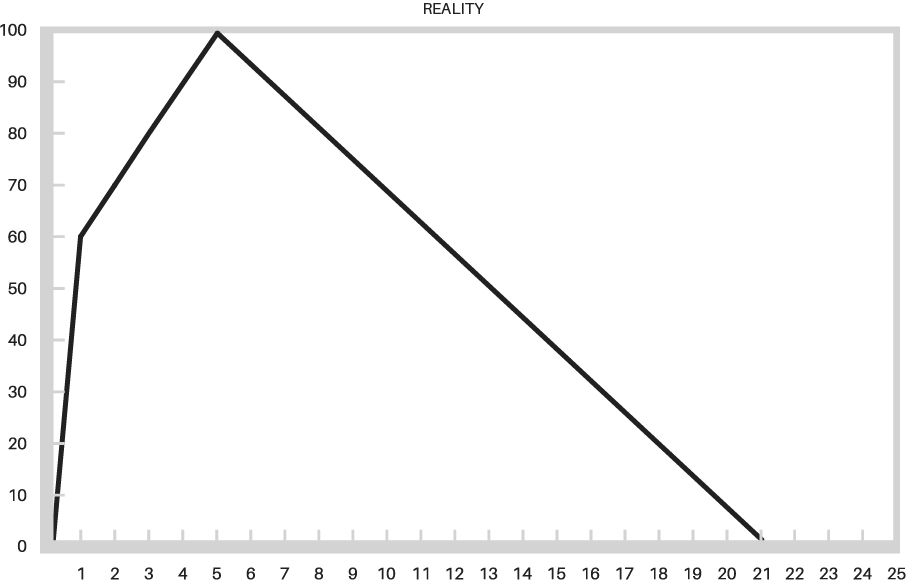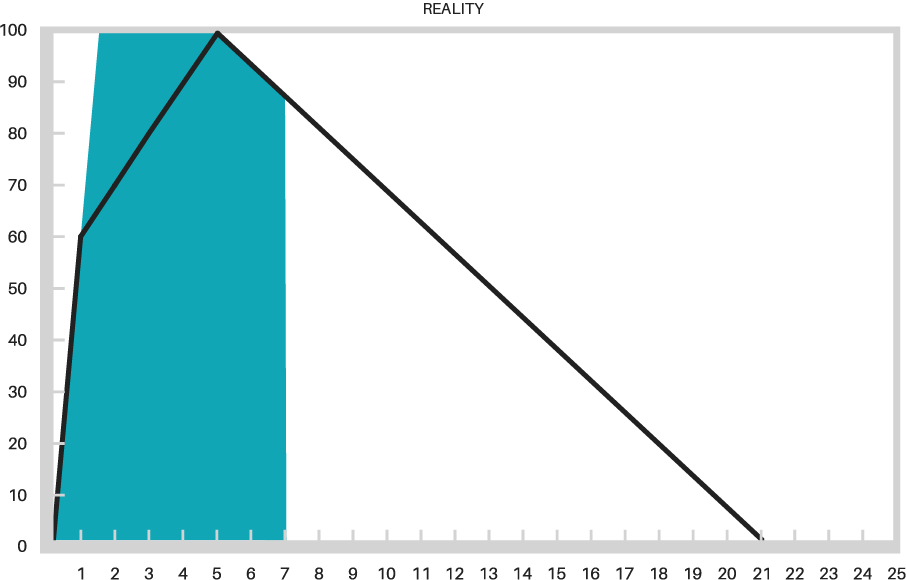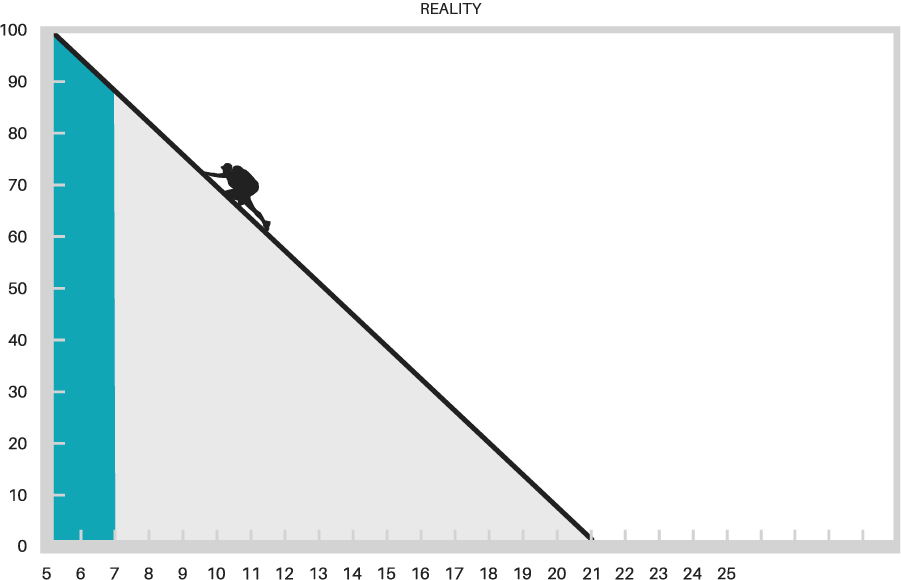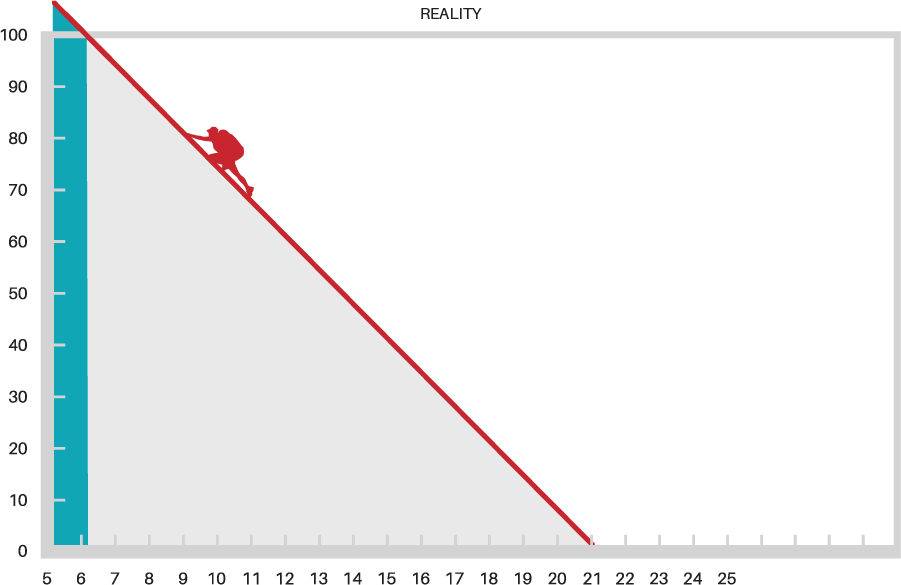Here was the graph from the previous post:

As we saw, the person fully experiences reality on ONLY one day!
Let's look at the amount of pleasure the man felt during this same process. On this graph, the blue area represents "pleasure".

Since the person believes they are fully experiencing the aroma on Days 1-4, each day they experience what they believe at that time is maximum pleasure. On Day Five, they are experiencing maximum pleasure AND they are fully experiencing reality.
On Day Six, they are experiencing something slightly less than full reality and the pleasure decreases.
On Day Seven, they are experiencing even less than full reality and the brain recognizes the pattern that this is decreasing, which causes the pleasure to drop until the person may actually become angry on Day Eight or Nine, wishing it could return to the "olden days"!
All of this leads to the rest of the groundbreaking conclusion:
Our brains are not designed to fully experience reality; our brains are designed for pleasure.
Let me say that again: Our brains are designed for pleasure.
What is the strategy for happiness?
The goal is to stay to the left of the graph! That way you can experience pleasure indefinitely!
The issue is people think our brains work differently than they actually do... and it leads to a completely familiar philosophy of life.
Below is our culture's "philosophy of life". It is the same as the happiness graph beginning at Day Five.

Basically, people in the flat part of the graph to the right are in misery and want to kill themselves. People who effort their way to the left up the mountain are keeping themselves out of misery so they don't kill themselves. However, they are not satisfied, so they continue to effort up the mountain to the pleasure at the peak. The only exultant moments they have are near the top of the mountain.
This is the "Philosophy of Life" from our culture: the only good moments in life are at the top of the mountain.
"Yeah, I have a great life. Two months ago, I had this awesome experience! I'm hoping to have another one next month!" Isn't that the example of a "great life" put in front of us to inspire us?
Notice, once they get to the peak, they experience pleasure and they are naturally dragged back down the mountain because our brain essentially pushes us to the right as if there were some strong wind blowing from left to right. Now, the only way to experience pleasure again is to effort back up the mountain. However, it needs to be a bigger mountain in order to experience the same pleasure. Remember, the brain is used to the previous level of "Reality".

Looking back to our analogy of the man going to his girlfriend's house. If we had doubled the aroma strength around the girlfriend's door after Day Twenty-One, the man would have smelled everything greater than what he habituated to, so he would experience the same strength as what he experienced on Day Five. Then he would habituate to that. In order to get the same pleasurable experience, we would have to continually increase the strength of the aroma. Notice, we can't do this indefinitely.
Likewise, when it comes to a person's life, in order to experience pleasure, this process of efforting up the mountain continues throughout the person's life until eventually the mountain is too high to scale and the person is no longer able to feel the extreme pleasure at the peak.
We cannot fully experience reality for more than a moment and continuing to believe a full experience of reality ought to be our goal results in requiring more effort, while actually increasing the rate at which we cease to experience pleasure.
It’s easy to habituate to a fragrance. It is hard to habituate to a person if you continue to get to know them, but it can result in sustainable pleasure.
A lot of people try to focus on goals that are a minimum or a maximum. For example, zero errors or zero injuries, or maximum productivity. The reality is EVERY goal in which we focus on a maximum or minimum as an end in itself will NEVER be satisfying over the long term. Our brain will wipe out our ability to enjoy it once we have mastered it, and our brain will prevent us from experiencing pleasure. Whenever ANYONE expresses a goal involving a minimum or a maximum, I shake my head and think that person is hurting people by making them addicts.
However, "experts" justify their approach with the argument: Do you think it is better if people don't reach the peak? That is the same argument cigarette makers made in the 1950s when advertising the health benefits of their products. After all, when a person is operating heavy machinery or driving late at night, a cigarette keeps them more alert.
"Do you want people to not be alert when they are operating heavy machinery or driving late at night?"
I want people to remain awake, but I DO NOT want the solution to give them cancer in the long term.
I want people to get up the mountain and experience pleasure. However, I don't want the method to hinder their future ability to experience pleasure and increase their risk of depression and suicide.
I'm going to leave you with one example. Athletic coaches have become better at getting their high school and college athletes up this mountain resulting in better performance. At the same time, the Growth, Opportunities, Aspirations, and Learning of Students in College, also known as the GOALS study, showed in 2010 that about half of college athletes end up depressed and a seventh of them have seriously considered suicide. The next study in 2015 showed all of these numbers got worse.
Helping people get up the mountain without getting them over to the valley is actually damaging the person... and it all begins with the belief our brains were made to fully experience reality.
Next post: Strategies For Happiness